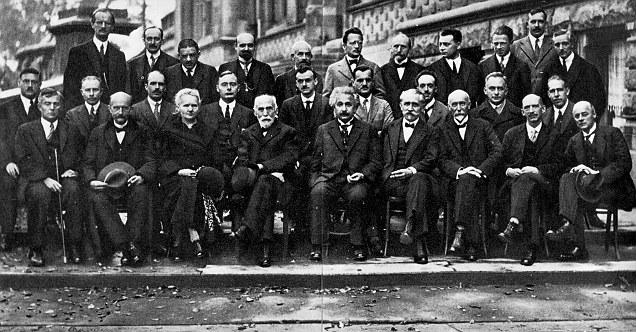-
Posts
6286 -
Joined
-
Last visited
-
Days Won
36
Content Type
Profiles
Forums
Events
Everything posted by J.C.MacSwell
-
In SR a flat plane in any inertial frame is a flat plane in all others, is it not?
-
I always thought it was both oral and anal sex, and did not equate it with homosexuality. (not that there's anything wrong with that...) I would think it would be advantageous for pair bonding and also for "playing around" which could lead to coitus and potentially fertilization by intent, experiment or accident. It is not like we are born with instincts to know exactly how to reproduce. (uneducated opinion only...not my field of expertise...more of a hobby LOL)
-
Copenhagen Convention? Is there another name for it? The fifth Solvay Conference in 1927 in Brussels was quite famous for discussions of the Copenhagen interpretation of quantum mechanics by Bohr A. Piccard, E. Henriot, P. Ehrenfest, E. Herzen, Th. de Donder, E. Schrödinger, J.E. Verschaffelt, W. Pauli, W. Heisenberg, R.H. Fowler, L. Brillouin; P. Debye, M. Knudsen, W.L. Bragg, H.A. Kramers, P.A.M. Dirac, A.H. Compton, L. de Broglie, M. Born, N. Bohr; I. Langmuir, M. Planck, Marie Curie, H.A. Lorentz, A. Einstein, P. Langevin, Ch.-E. Guye, C.T.R. Wilson, O.W. Richardson Fifth conference participants, 1927. Institut International de Physique Solvay in Leopold Park.
-

Possibility to survive a building jump?
J.C.MacSwell replied to LabRat1's topic in Brain Teasers and Puzzles
If you could, somehow, control the sheet to get lift without full stall you would be going pretty fast but eventually approaching the ground at an angle. Last second you pull up hard, killing what speed you can and should hit the ground "running"..."running" being a euphemism for tumbling rapidly to your demise...but at least you tried. -
Ouch! I thought I had something there...was just beaming. Now I feel like I've been punched in the solar plexus.
-
Well...me. Bidding starts at 35 cents. Don't worry about what you might or might not be able to do with it...this is your chance to own the vast majority of the mass of the Solar System.
-
Reading the abstract it seems to surmise that genetics is a significant factor. I don't think there is a claim that it is the only one.
-

Accelerating Expansion of the Universe?
J.C.MacSwell replied to Cosmo_Ken's topic in Astronomy and Cosmology
Hard to believe they can be comfortable making that claim wrt the accuracy. I suspect they've been staring at the numbers a little too long, or Wiki is misquoting based only on their assumptions and associated perceived precision. They simply cannot be that confident in all the assumptions that is based on. It wasn't that long ago they wondered why some Galaxy's appeared to be older than the Universe appeared to be. -

When to use Special versus General Relativity?
J.C.MacSwell replied to aramis720's topic in Relativity
Is this "pick the one that actually exists"? -
15 days of darkness? 30 half days...sounds about right...
-
Unfortunately I am not familiar with the warp drive, but spaghettification should happen where there is enough gravity gradient, and (presumably?) crushing perpendicular to it when approaching or inside a blackhole.
-
Not sure, but I think they prefer to use copper...wouldn't want to steel His thunder
-

Could relativity be incorrect
J.C.MacSwell replied to PrimalMinister's topic in Modern and Theoretical Physics
Right. 99+ % of the time the old paradigm is more correct than what may or may not emerge to replace it. So it's like "don't quit your day job" while you invest in something new, you try to keep an open mind but stay with what has proven to work in the interim. You build on the past. -

calculating human horsepower for science fair project
J.C.MacSwell replied to Elite Engineer's topic in Classical Physics
She can calculate a simple average net output of power (work/time) by measuring vertical distance gained X body weight/time taken if she uses stairs. On the horizontal the only net output of power is during the acceleration stage. No work is accomplished after that. Though she could compare the rates of distance against drag forces, or work expended, it is less straight forward. -
Wiki can get you started. https://en.wikipedia.org/wiki/Quantum_entanglement
-
You should check your assumptions and math. If you do it correctly you will get the same answer for each distance. The bolded is correct so you almost got the first one correct.
-

Transuranic elements in a star
J.C.MacSwell replied to Moontanman's topic in Astronomy and Cosmology
Hi Moontanman I was interested enough to watch the video and found it interesting/puzzling, but unfortunately can't add much. No plausible explanation comes to mind. Hard to believe Aliens would produce enough plutonium and other waste (and then dump it into the star) so presumably it would be naturally caused. -

Astrophysics pictures for all the Big Bangers
J.C.MacSwell replied to studiot's topic in Science News
She actually was quoted as saying "just behind" with regard to ranking, which is better...though not by much for reasons you stated. Quote was: "If you ranked all the explosions in the universe based on their power, GRBs would be right behind the Big Bang." -
Well now. That's at least a hint of understanding.
-
I wasn't suggesting they were economically viable. Just that they exist. They would only be reliable in limited circumstances, and generally only downwind. But I found them interesting.
-
Kite sails are already in use to propel, or assist in propelling, ships. Some types I believe are in part inflated. https://en.wikipedia.org/wiki/SkySails
-
This part to me describes what happens without expansion effects, like say two bodies moving with respect to each other inside our solar system. So what if they are far apart enough for an expansion effect, but not enough to lose contact? It would seem like a gain in energy as mistermack alludes to, even without accelerated expansion.
-
Right...was one a... duck?
-
None of the examples where there is no restoring torque has any movement of the CoM. Laterally or vertically. When the CoM does move (accelerate) laterally, there is an offsetting lateral force as well.


